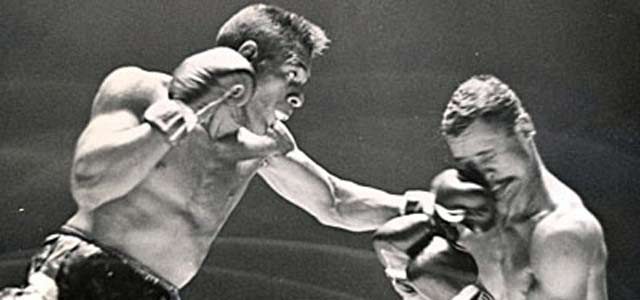Long before he became known as the Mayor of North Philadelphia, George Benton was a wide-eyed youngster hanging out at Johnny Madison’s gym, Hutchinson & Girard. He swept the floors, lined up the water bottles and collected dimes from spectators who paid to watch Philly’s top pros train in the mid-1940s.
Benton, born May 15, 1933 in Philadelphia, never played sports at Ben Franklin High School because he had been into boxing since he was 8 years old.
“Boxing was something I liked and never got over it,” Benton said. “I remember Madison owned the gym from 1942 to 1944 because he always went around saying, ‘Hitler’s gonna win the war, Hitler’s gonna win the war.’ After he sold the gym to Herman Diamond, I stopped going for a year. When I came back, I met Joe Rose and we got along and he became my trainer for my entire career.”
Benton was 13 years old when he had his first amateur fight.
“Walt Tannehill (amateur coach) could do anything in those days,” Benton said. “He got someone to draw up an affidavit saying I was 16 and I signed it. When I went to put my hand on the Bible, the guy holding the Bible yanked it away the split second I was about to touch it. That’s how they did things.”
Benton’s 67-10 amateur career ended when he won the 147-pound title in the 1949 Inquirer Diamond Belt tournament. He turned pro later that year and won his first seven fights. When Frenchman Robert Villemain came to town to fight Sugar Ray Robinson in 1950, Benton went to training camp in Pleasantville, NJ, as Villemain’s chief sparring partner.
Benton was 17 years old with a 7-0 record. Villemain was 26 with a 41-3-1 record. He had relinquished the French and European welterweight titles to compete as a middleweight and he had beaten Tony DeMarco, Jake LaMotta and Kid Gavilan.
“I was boxing Villemain, trying to learn his style, absorb his strength,” Benton remembered. “Once I could do that, he couldn’t handle me and I started bombing the hell out of him, stepping around, making him look silly. George Kanter, his agent, pulls me aside and tells me the newspaper guys are coming to camp tomorrow and he wants me to make Villemain look good. I said okay. As it happened, it was the first time my father and my step-mother came to see me box and I had to put on a show for them. Which I did! When we finished sparring, Kanter came up to me and said, ‘Do you want it now or should we mail it to you?’ I said what? He said, ‘Your money. You can get it now or we can mail it to you because you’re fired.'”
Benton kept fighting and winning. By the time he was drafted into the Army in 1956, he was 30-2-1, 15 KOs, and he had beaten contenders Holly Mims and Bobby Jones.
“I was stationed at Fort Jackson, Columbia, South Carolina,” Benton said. “I had a lady in Columbia and I was at her house one Sunday reading the newspapers. There was a story about a boxing promoter and a show he was running in Charlotte, North Carolina. My lady told me she knew the guy because he owned a record shop and her kids bought records there.”
“So we went downtown with the kids and I went into his store and told him I was a boxer. He asked me what name I boxed under and when I told him George Benton he said he had heard of me. I gave him the Army post address. About two days later I get a call from the CQ (company headquarters) to get down there. The promoter was on the phone asking me if I could box six rounds that same night. I told him I could and I twisted a few arms to get permission to leave base.”
“A friend drove me to Charlotte. I weighed in at 162 and spent about three hours in a hotel room. The promoter told me to use the name Willie James since James was the guy I was replacing. That night I’m warming up in the dressing room and as I turned around I’m staring right into the face of Angelo Dundee. He had Billy Kilgore in the main event against Al Andrews. When he saw me his mouth and his eyes were wide open. Before he could say a thing, I put my finger to my lips. He understood and left the room.
“When I get to the ring I’m trying to act as amateurish as I can but it’s not easy when you’re a pro. I start jabbing the guy (Henry Ray) but it’s so easy I start going to his body. When he fired a right hand at me, I rolled back with it and, instinctively, came back with my own right and he went down. When he got up he must have thought it was a mistake because he came after me again. I dropped him again but the bell saved him. I go back to my corner and this local coach says to me, ‘You’re not supposed to know how to fight.’ I said to him, ‘Just rinse out my mouthpiece, please.’
“After I knocked the guy out in the second round, I put on a robe and as I’m leaving the ring, I hear someone call out, ‘Hey George, George Benton.’ I tried not to look but it was Sandy Grady, the Philly sportswriter who was in Charlotte working at the time. The next day in the local paper, the headline reads “This Is Willie James.’ It was a big story and the national wire services picked it up. I was a hero on the base but the company commander was worried he’d get into trouble for letting me out but it turned out okay. But I couldn’t fight again in the army. When I went to Korea, they made me the boxing coach and my team won all the tournaments in Asia.”
Benton got out of the service in 1958 and picked up his career, but won only seven of his next 12 fights—eight of them out of town—before Marty Kramer introduced professional boxing to an old lodge house on North Broad Street, which eventually became known as the Blue Horizon.
On opening night, Nov. 3, 1961, Benton ended a one-year layoff by knocking out Chico Corsey, of Chester, PA, in three rounds. Staying active for the first time in two years, Benton won three more times at the Blue Horizon in the next five months before facing local rival Jesse Smith on May 28, 1962, at Convention Hall in West Philadelphia.
Benton won a convincing 10-round decision and landed a summer showdown with South Philadelphia’s Joey Giardello. Benton had been known as the bridesmaid but never the bride. This was his chance. In front of 9,449 fans, paying more than $51,000 in 1962 dollars, Benton used every move in his arsenal.
Veteran boxing writer Jack McKinney summed it up in the Philadelphia Daily News: “George Benton, the man, finally caught up with George Benton, the legend, last night and the two walked out of Convention Hall together. After 13 years of frustration and unfulfilled promise, the gifted North Philadelphia middleweight finally tore loose from his personal treadmill to win the biggest fight of his career with a solid decision over veteran contender Joey Giardello.”
Benton’s manager, Herman Diamond, refused to do business with certain mob people and that’s why Benton never got a chance at Dick Tiger’s middleweight crown. In fact, the 160-pound title changed hands 22 times during Benton’s career and he never got a shot at it.
“Herman was in the installment business,” Benton said. “A dollar down and a dollar a week for the rest of your life.” He worked out of his car. Later, he ran a grocery store in Northeast Philly. We never had a contract and I never left him.”
Three wins later, Benton made his Madison Square Garden debut against the ideal foil, Rubin “Hurricane” Carter. Instead of using his smarts and his boxing ability, Benton tried to impress the New York crowd and go for the big knockout. It didn’t work and he lost a 10-round split decision which put him back of the pack.
“I didn’t care for nothing except the knockout,” Benton told Larry Merchant, of the Daily News. “That’s the only reason I came here tonight. I wanted to knock him out and look good.”
Seven months later, Giardello took Tiger’s crown by decision in Atlantic City, but never defended against Benton. He did defend against Carter late in 1964, winning by decision. Benton never got a taste.
He fought on, beating future heavyweight champ Jimmy Ellis. More often than not, Benton took fights on short notice for the money, never boxing more than three times in any one year. A month after losing to Juarez DeLima in Madison Square Garden in 1970, he was shot in the back after a street confrontation and never boxed again. He was 37 years old and his career record was 61-13-1, 36 KOs.
A few years later, Benton began training fighters. He worked with Joe Frazier, but he “made his bones” as a trainer when he took over Bennie Briscoe’s career in 1975, guiding Briscoe through his next 12 fights (unbeaten) into a 1977 title fight with Rodrigo Valdes in Italy.
In the early 1980s, Benton was hired by Dan Duva’s New Jersey-based Main Events company and became their lead trainer, developing Pernell Whitaker, Evander Holyfield and a host of world champions. Ironically, it was as a trainer that earned Benton induction into the International Boxing Hall of Fame in Canastota, NY, in 2001.
(written in 2007)


